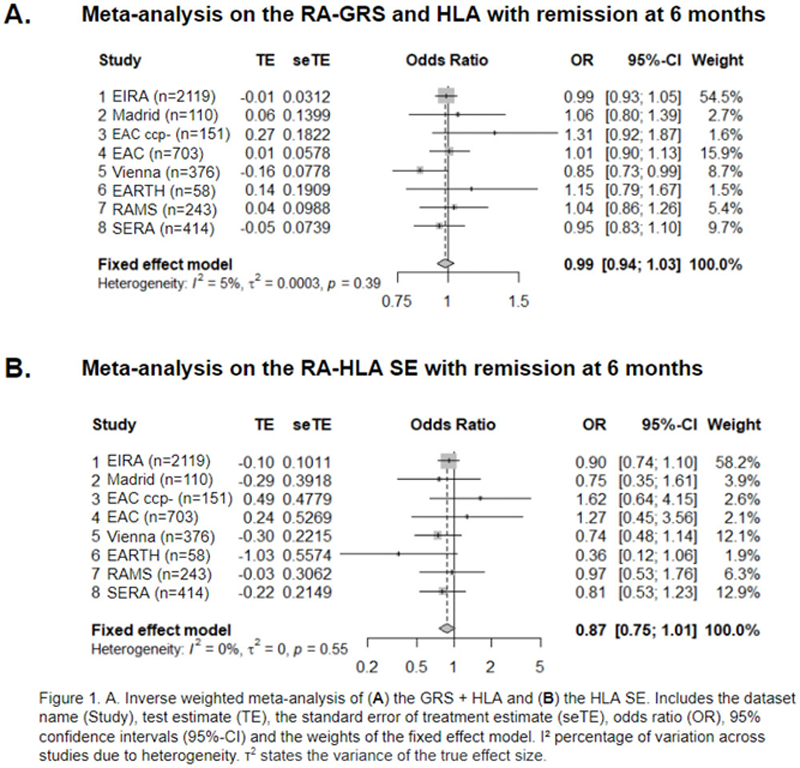

Background: Patients who achieve remission promptly could have a specific genetic risk profile that supports regaining immune tolerance. The identification of these genes could provide novel drug targets.
Objectives: To test the association between RA genetic risk variants with achieving remission at 6 months.
Methods: We computed genetic risk scores (GRS) comprising of the RA susceptibility variants 1 and HLA-SE status separately in 4425 patients across eight datasets from inception cohorts. Remission was defined as DAS28CRP<2.6 at 6 months. Missing DAS28CRP values in patients were imputed using predictive mean matching by MICE. We first tested whether baseline DAS28CRP changed with increasing GRS using linear regression. Next, we calculated odds ratios for GRS and HLA-SE on remission using logistic regression. Heterogeneity of the outcome between datasets was mitigated by running inverse variance meta-analysis.
Results: Evaluation of the complete dataset, baseline clinical variables did not differ between patients achieving remission and those who did not (
Summary of the data separated by disease activity after 6 months.
| all | Remission at 6 months | No remission at 6 months | |
| N | 4425* | 1558 | 2430 |
| Age, mean (sd ) | 55.38 (13.87) | 5517 (14.09) | 55.62 (13.59) |
| Female % | 68.98% | 65.43% | 70.73% |
| ACPA+ % | 61.94% | 63.53% | 61.67% |
| Baseline DAS28, mean (sd ) | 4.76 (1.22) | 4.47 (1.23) | 5.1 (1.15) |
*not all patients had 6 months data

Conclusion: In these combined cohorts, RA genetics risk variants are not associated with early disease remission. At baseline there was no difference in genetic risk between patients achieving remission or not. Studies encompassing other genetic variants are needed to elucidate the genetics of RA remission.
REFERENCES:
[1]Knevel R et al. Sci Transl Med . 2020;12(545):eaay1548.
Acknowledgements: This project has received funding from the Innovative Medicines Initiative 2 Joint Undertaking under grant agreement No 777357, RTCure.
This project has received funding from Pfizer Inc.
Disclosure of Interests: Samantha Jurado Zapata: None declared, Marc Maurits: None declared, Yann Abraham Employee of: Pfizer, Erik van den Akker: None declared, Anne Barton: None declared, Philip Brown: None declared, Andrew Cope: None declared, Isidoro González-Álvaro: None declared, Carl Goodyear: None declared, Annette van der Helm - van Mil: None declared, Xinli Hu Employee of: Pfizer, Thomas Huizinga: None declared, Martina Johannesson: None declared, Lars Klareskog: None declared, Dennis Lendrem: None declared, Iain McInnes: None declared, Fraser Morton: None declared, Caron Paterson: None declared, Duncan Porter: None declared, Arthur Pratt: None declared, Luis Rodriguez Rodriguez: None declared, Daniela Sieghart: None declared, Paul Studenic: None declared, Suzanne Verstappen: None declared, Leonid Padyukov: None declared, Aaron Winkler Employee of: Pfizer, John D Isaacs: None declared, Rachel Knevel Grant/research support from: Pfizer